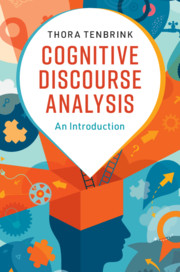Book contents
- Cognitive Discourse Analysis
- Cognitive Discourse Analysis
- Copyright page
- Contents
- Figures
- Tables
- Preface
- Acknowledgements
- Introduction
- 1 Background and Scope
- 2 Language as a Representation of Thought
- 3 Resources
- 4 Identifying Cognitive Orientation
- 5 Identifying Cognitive Depth
- 6 Identifying Cognitive Constructiveness
- 7 Using Language to Convey Thoughts
- 8 CODA Procedures
- 9 Beyond CODA
- Register of Linguistic Features
- References
- Index
6 - Identifying Cognitive Constructiveness
Published online by Cambridge University Press: 23 January 2020
- Cognitive Discourse Analysis
- Cognitive Discourse Analysis
- Copyright page
- Contents
- Figures
- Tables
- Preface
- Acknowledgements
- Introduction
- 1 Background and Scope
- 2 Language as a Representation of Thought
- 3 Resources
- 4 Identifying Cognitive Orientation
- 5 Identifying Cognitive Depth
- 6 Identifying Cognitive Constructiveness
- 7 Using Language to Convey Thoughts
- 8 CODA Procedures
- 9 Beyond CODA
- Register of Linguistic Features
- References
- Index
Summary
Chapter 6 addresses two ways in which our minds can be constructive: either by making inferences on the basis of what’s already there – filling in gaps of information, or by transforming what’s there into something new. This twofold ability of the human mind to construct is basic to our existence, enabling us to go beyond what we encounter around us. The way we talk reflects both inference and transformation processes systematically. Inference involves taking observable facts and combining them with further knowledge or assumptions, in order to come to new insights or conclusions that aren’t directly observable. Transformation, on the other hand, involves taking observable facts or objects and turning them into something different, something that isn’t yet there but that can be accomplished using available tools and operators. Chapter 6 looks at each of these processes of cognitive constructiveness in turn.
Keywords
- Type
- Chapter
- Information
- Cognitive Discourse AnalysisAn Introduction, pp. 142 - 167Publisher: Cambridge University PressPrint publication year: 2020



